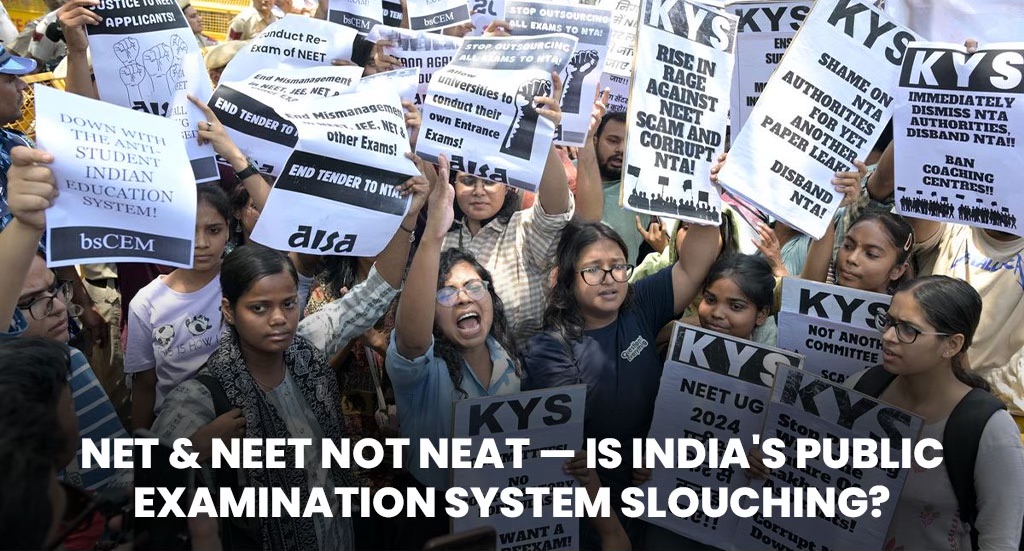On the evening of June 19, the Education Ministry announced the cancellation of the UGC-NET examination. This decision was made after the Ministry of Home Affairs expressed concern that the examination’s integrity had been jeopardised. The National Testing Agency (NTA) is responsible for conducting the University Grants Commission-National Eligibility Test (UGC-NET).
The UGC-NET is conducted twice a year by the NTA to assess candidates’ eligibility for the roles of ‘Assistant Professor’ and ‘Junior Research Fellowship and Assistant Professor,’ as well as for admission to PhD programs.
Earlier on May 5, The National Testing Agency (NTA) administered the medical entrance exam National Eligibility-cum-Entrance Test (NEET) UG 2024. The Patna Police stated in court that the question paper for NEET had been leaked. This year, a record-breaking 23 lakh students registered for NEET (UG). The NEET 2024 results, announced on June 4, 2024, have stoked similar controversy, triggering a massive uproar, with several aspirants and parents demanding an investigation and seeking a re-examination, alleging that the paper was leaked at particular centres where students got high scores.
How the leaks happen
There are several ways to leak the paper. The reports state that the complete paper was once leaked on WhatsApp within seconds of the exam starting. On the other hand, the accused in the Madhya Pradesh paper leak hacked the system. The paper for the UP Police Recruitment Examination was leaked with the knowledge of the Transport Corporation company, which was tasked with transferring the material from the warehouse once it had been printed. The paper has frequently leaked from the test centre.
For decades, India’s public examination system has been highly esteemed both domestically & internationally. It is considered challenging, yet fair and transparent. The success of the system is evident in the achievements of Indian students, who excel in various competitive exams and gain admission to prestigious Ivy League universities. This multifaceted examination system forms a cornerstone of India’s educational framework, supporting students from school through higher education and beyond.
From marquee exams like IIT admission tests and pre-medical entry NEET to mid-term school papers in Punjab and constable recruitment in Haryana, no institution appears to be immune. Unfortunately, such leaks are having a negative influence on the brand value of some well-known public institutions, jeopardising their reputation and the futures of their otherwise talented students.
However, in recent years, the situation has deteriorated. Examination papers, once viewed as inviolable, are now leaking at an alarming rate—a scenario the founding fathers of India’s education system could never have imagined.
Emotions run high among students
Paper leaks in India’s public examination system have severe repercussions. They increase stress and anxiety among students, as the uncertainty of whether exams will take place undermines their mental health. Secondly, leaks disrupt the academic calendar, causing postponements or cancellations that complicate schedules, especially for those preparing for competitive entrance exams.
The erosion of trust in the examination system leads to a loss of faith in its fairness and integrity, diminishing students’ motivation to excel academically. The financial burden of exam preparation increases when leaks result in additional expenses for coaching, study materials, and exam fees, straining families further.
Furthermore, paper leaks compromise the integrity of exam outcomes, making it difficult for students to gain admission to prestigious universities, secure scholarships, or obtain job opportunities, thus threatening their future prospects.
Measures Taken on the Issue
Several state governments have passed strong legislation to address paper leaks and cheating. Despite these efforts, paper leaks continue. The Central Government recently enacted ‘The Public Examinations (Prevention of Unfair Means) Act, 2024’, which imposes three to 10 years in prison for anyone who aids exam cheating. This law applies to the majority of examinations conducted by the Central Government and its testing institutions. Nonetheless, imposing harsh punishments will not adequately address this issue.
On Tuesday, June 20, the Supreme Court directed the National Testing Agency (NTA) to assume accountability for any lapses in reorganising the NEET UG 2024. Additionally, the NTA informed the Ministry of Education that candidates from Patna and Godhra, who were being investigated for potentially benefiting from alleged irregularities, did not appear to have gained any undue advantage based on an assessment of their scores.
The issue has also been picked up by political parties, who have begun reaping the benefits. The future of NET and NEET aspirants, meanwhile, still hangs off the cliff.








